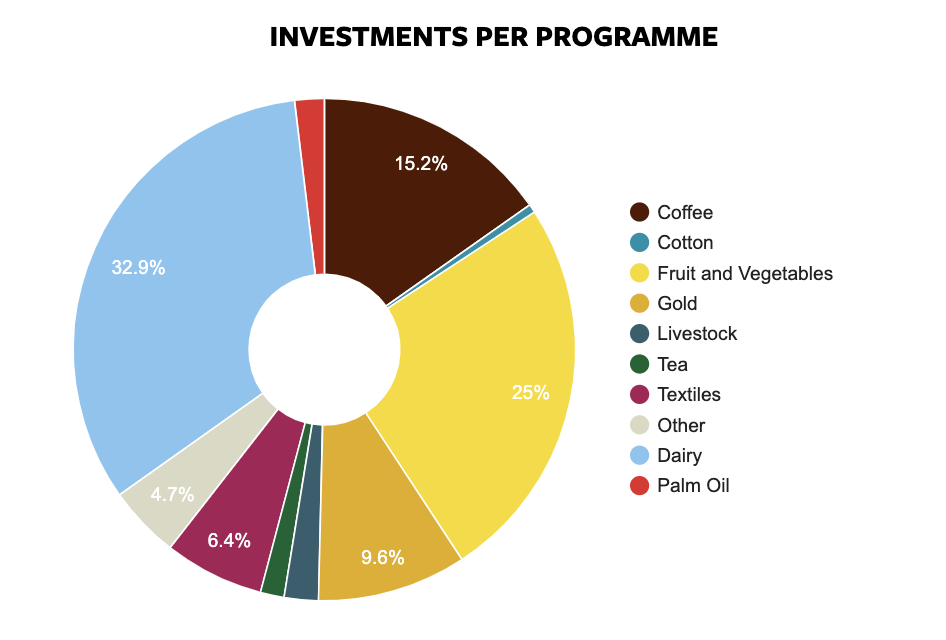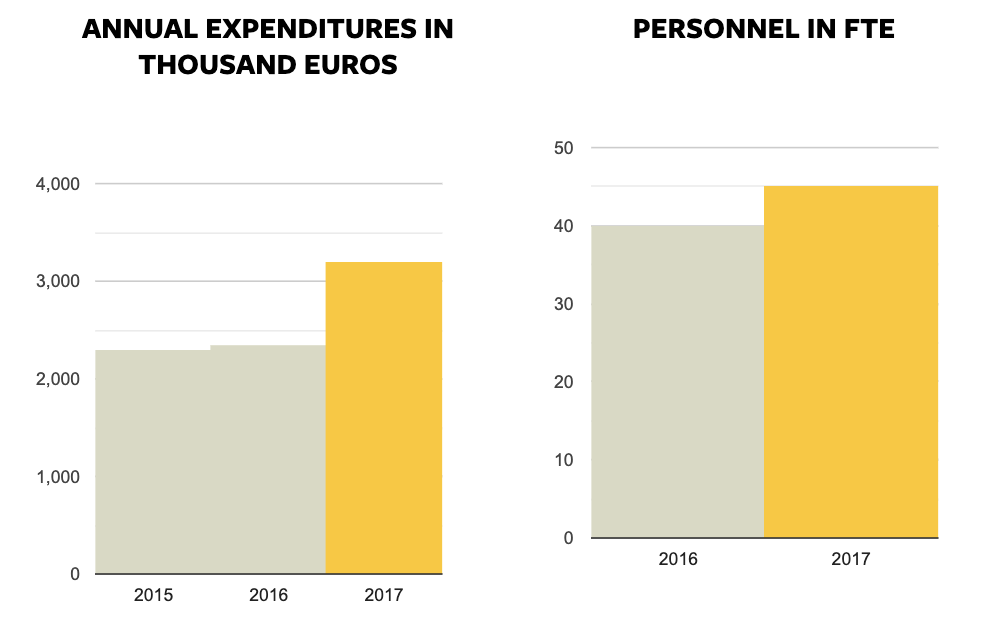COFFEE
Solidaridad implemented the coffee programme in Kenya and Ethiopia, cumulatively reaching 831 trainers of trainers, 3,709 lead farmers and 80,136 farmers. In Ethiopia, farmers supply their coffee beans to coffee unions which carry out processing and marketing, but in Kenya, the farmers’ coffee beans are processed and marketed through cooperative societies. Solidaridad implements this coffee programme through three unions in Ethiopia, Sidama, Oromia and Yircachaffee, and more than 15 cooperative societies in Kenya.

COTTON
Solidaridad began a pilot aimed at introducing sustainable cotton production in Ethiopia for two commercial farms and one cooperative union linked to the supply chain of H&M. This is a result of recommendations made in a study conducted with the Cotton Association, commissioned by H&M and the Dutch government. A total of 1,200 workers will benefit from decent work practices and over 1,800 hectares of cotton will be converted to sustainable production.

FRUIT & VEGETABLES
Solidaridad supported 11,500 fresh vegetable farmers to supply 2,160 metric tonnes of fresh beans valued at 864,724 euro at farm gate. From this, a total of 1,527 metric tonnes were exported to Germany and France. In addition, a total of 5,300 farmers sold bananas, watermelons, onions, tomatoes, capsicums and butternuts at local supermarkets.

GOLD
Solidaridad continued to implement gold programmes in Kenya, Tanzania and Uganda aiming to support miners in good mining practices in terms of Fairtrade mining standards. The Solidaridad gold programme in these countries conducted training on Fairtrade mining standards reaching 434 miners.

TEXTILES
In 2016, Sympany Foundation and Solidaridad embarked on a three-year partnership to drive sustainability in the Ethiopian textile and garment sector and in 2017, Solidaridad approved additional budget to match funding of Sympany. This will improve sustainable employment for 30,000 workers and promote cleaner production. Activities were expanded by eight additional factories under the Better Mill Initiative, reaching 12 factories with direct technical support services. Crucial partnerships have been established with stakeholders including the Ethiopian Textile Industry Development Institute and the Ethiopian Textile Garment & Manufacturers’ Association.

DEVELOPMENTS
There is an economic integration process among East African countries evident through the establishment of five one-stop border posts, as well as the enactment of the One-Stop Border Post Act in the East African legislative assembly. This is expected to quicken the movement of people, goods and services to strengthen the East Africa Community, a trading bloc of five countries including Kenya, Uganda, Rwanda, Tanzania and Burundi.
Exponential population growth, high unemployment, social inequality, climate change, food insecurity and political instability present challenges for the region. To address these, Solidaridad in East Africa continues to implement food security and climate change projects.
Solidaridad continues to partner with government, private sector players and other development partners to deliver sustainable value chains. Solidaridad has established multi-stakeholder platforms in Kenya, Tanzania, Uganda and Ethiopia to champion for favourable policies.

ACHIEVEMENTS
Implementation of the Advocacy for Change programme has made considerable achievements. In 2017, it led to the establishment of the Kenya Coffee Platform, Kilimanjaro Landscape Platform and horticulture platforms in Uganda and Tanzania.
In 2017, Solidaridad began implementing the Practice for Change programme. This programme conducts interventions in coffee, leather and textile value chains. In the coffee value chain, we will work with a total of 15,900 small and medium-scale farmers in Tanzania, Kenya and Uganda to transform their production systems. In the textile value chain,12 textile factories with a total of 17,500 workers will receive support in capacity building. In the leather programme, the capacity of 32 micro, small and medium enterprises will be enhanced by 2020.
New programmes including the Green Tanning Initiative were commenced. This is a 1.3 million euro leather project to be implemented over three years in Ethiopia. Solidaridad also partnered with Fairphone, Hivos, Apple and UNICEF on a new project focussed on anti-child labour in artisanal and small-scale mines in Uganda. This project will target three artisanal and small-scale mines in the Busia Region in Uganda. This will benefit an estimated 2,500 artisanal miners who will be trained on good mining practices.
The Golden Line Programme in Tanzania aims to benefit 2,250 artisanal miners and has initiated activities championing the operations of artisanal mining and its contribution to the economic empowerment of women and communities. Through this initiative, miners and mine owners are made aware of formalizing and legalizing their operations according to mining requirements and regulations.

PARTNERSHIPS
The Dutch government, Comic Relief, and the European Union are currently the main donors in East Africa funding sustainable programmes. In 2017, Solidaridad partnered with Fairphone, Hivos, Apple and UNICEF under its gold programme to address child labour in gold mining sites in Uganda. This is also funded by the Dutch government through RVO.
With the textile programme, Solidaridad is planning to formalize a partnership with the International Labour Organization to promote decent work in the local textile industry. It is also working with the International Finance Corporation to improve access to finance and advisory services to factories.
Under cotton partnerships between different supply chain actors, including the Ethiopian government, the Cotton Association, Kanoria Textiles and H&M. Learnings and successful practices from this pilot will form the basis for a larger initiative that will reach more farmers, commercial farms, workers and manufacturers in the years to come.
ORGANIZATION
Solidaridad East Africa brought on board additional staff in 2017 in relation to the new innovation areas as well as new projects. A total of four experts for gender inclusivity, impact investment, digital solutions and climate change were hired. In addition, two managers for coffee and gold programmes joined Solidaridad. Therefore, in 2017 the total number of staff was 44.
The climate expert represented the office at the Global Bonn Climate Change Conference in November 2017.
COMMUNICATION AND CAMPAIGNING
In 2017, East African projects became visible to local government bureaus and local partners through Solidaridad staff “on the ground” who act as ambassadors. Progress was made in the aggregation of commodity photography, production of field stories and news, as well as updating the region intranet. Best case stories from projects in Kenya (horticulture) and Ethiopia (textiles) were documented and presented on the Solidaridad website and social media sites. These efforts were boosted by the support from Solidaridad global communications manager in a training for East African staff on various aspects of development communication such as photography, presentations and story writing, The Golden Line project campaign started in 2017 with support from global communication manager and Tanzania office.
FINANCE AND CONTROL
The allocated Solidaridad East Africa budget for 2017 was about euro 5 million. Total expenditure in 2017 was euro 3.2 million, a 17% increase from 2016. Delay in staff recruitment for the practice for change project and Government delay in project approvals in Ethiopia and Uganda caused substantial underspending during the year and we expect to make progress during 2018. The region has financial staff in three country offices; Kenya, Ethiopia, and Uganda. Fundraising has been mainstreamed and project managers are encouraged to contribute to calls under their commodities. In 2018 a new strategy for project implementation will be adopted whereby projects will be implemented by own staff and less by relying on project partners.
